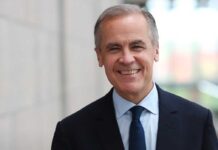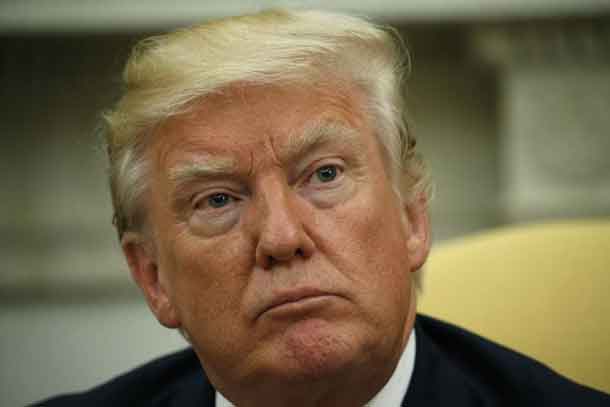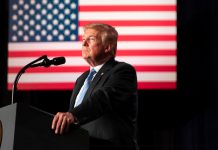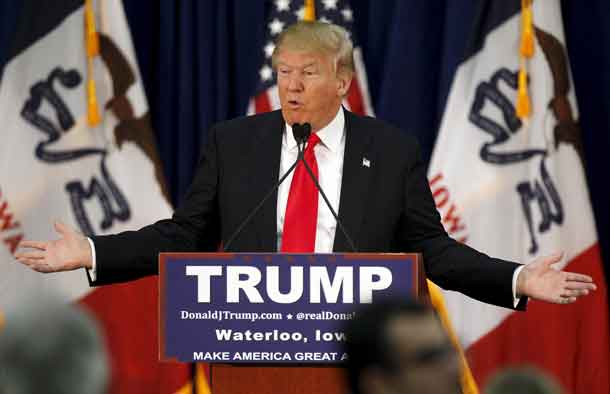

Donald Trump in Tight Race in Iowa Caucus
DES MOINES, Iowa (Reuters) – Donald Trump’s ground-breaking White House campaign faces a moment of truth on Monday when Iowa voters begin the nationwide process of choosing a new U.S. president, with polls showing him in a tight battle with Ted Cruz to be the Republican nominee.
On the Democratic side, front-runner Hillary Clinton is hoping to fend off a stiff challenge in Iowa from insurgent Bernie Sanders in the first of the state-by-state battles to pick party candidates for the Nov. 8 election to succeed President Barack Obama.
Late opinion polls showed Trump, a blunt-spoken billionaire businessman who has never held public office, with a small lead over Cruz, a conservative U.S. senator from Texas. Clinton had a slight edge on Sanders, a U.S. senator from Vermont.
But there is a large bloc of undecided voters in both parties in Iowa and no certainty on who will turn up at the caucuses on a wintry evening, given that many supporters of Trump and Sanders are new to the process and disenchanted with traditional politics.
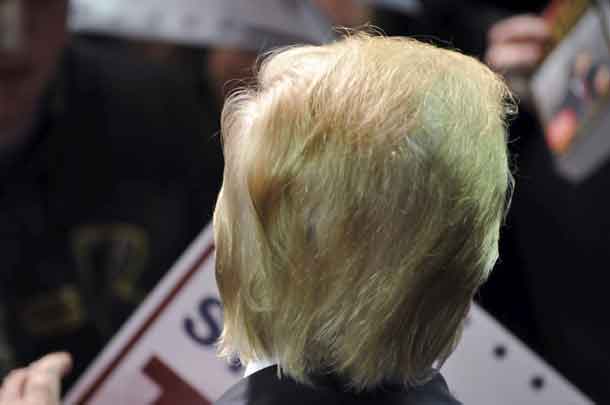
A Des Moines Register/Bloomberg Iowa poll on Saturday showed three in 10 likely Democratic caucus-goers and 45 percent of likely Republican caucus-goers were still uncertain and could be persuaded to switch to another candidate.
Iowans will begin choosing candidates at 7 p.m. CST (0100 GMT on Tuesday), with results expected within a few hours.
The caucuses will be the first time Trump, a real estate tycoon and former reality TV star, has put his political appeal to the test.
A win could validate an aggressive campaign that has alarmed the Republican establishment, dwarfed the efforts of many seasoned politicians and has been marked by controversies such as his calls for a temporary ban on Muslims entering the United States and for a wall along the Mexican border.
A loss for Trump would dent his carefully cultivated campaign persona as a “winner” and create immense pressure for a better performance in the next nominating contests – in New Hampshire and South Carolina – later this month.
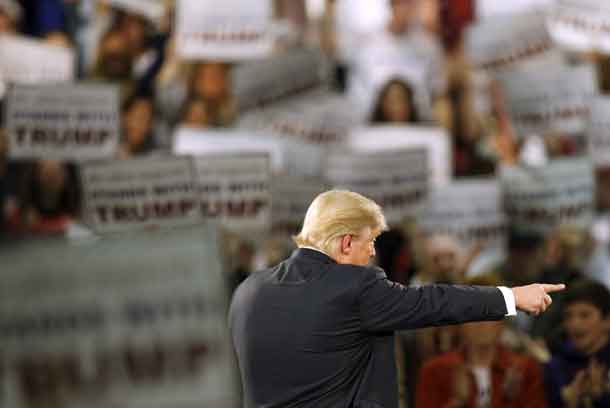
‘A LOT OF LOVE’
Trump said he was confident that Iowans who have attended his rallies in large numbers would turn out for him on Monday.
“It’s been an amazing journey, and there’s a lot of love in those rooms so I would think that they would show up to vote. I hope so,” he told NBC’s “Today” program.
The Iowa caucuses give the Midwestern state a political influence far greater than its population of just 3 million would suggest and kick off a process that leads to the parties’ formal presidential nominations this summer.
The caucuses are a long and sometimes arcane ritual, taking place in 1,100 schools, churches and other public locations across the Midwestern state. At least two Republican caucuses will be in private homes and a Democratic one will take place at an equestrian centre.
White House hopefuls descend on the state early and often and give people the chance to see them up close, meaning many Iowans are slow to decide who to back.
“I’m still checking them out. The field is large and it requires some thought,” said Paul Albritton of Carlisle, Iowa, a training coordinator at Iowa State University, as he waited to see U.S. Senator Marco Rubio of Florida last week. “I’m thinking about who can win in November.”
For the winners in Iowa, the prize will be valuable momentum that could stretch for months, while many of the losers on the Republican side could quickly begin dropping by the wayside.
Dave Burggren of Asbury, Iowa, a precinct leader for his local Republican caucus, has been to seven or eight candidate events, checking out Trump, Rubio, former business executive Carly Fiorina, and even Sanders, but said he still did not have “any idea” which candidate he would support.
“My philosophy is this: Which piece of candy do I want today?” Burggren said at a Trump event in Dubuque on Saturday.
WRONG TRACK
The 2016 election is shaping up to be the year of angry voters as disgruntled Americans worry about issues such as immigration, terrorism, income inequality and healthcare, fueling the campaigns of Trump and self-declared democratic socialist Sanders.
Some 73 percent of voters likely to head to the polls in November’s election say they think the country is on the wrong track, according to a Reuters/Ipsos poll last month.
On the Republican side, opinion polls show foreign policy hawk Rubio might win third place in Iowa and stake a claim as the best hope for the party’s mainstream.
For the Democrats, Clinton needs a win in Iowa to prevent a potential two-state opening losing streak that would raise fresh questions about a candidate who was considered the clear front-runner just two months ago, before a surge of support for Sanders.
Clinton, a former secretary of state and U.S. senator, often touts her years of experience in politics, and says she will defend much of Obama’s legacy.
Sanders has attacked from the left, saying he would do more than Clinton to take on Wall Street excesses and to help American workers who feel left behind by the slow economic recovery.
Clinton lost Iowa in 2008 and went on to lose a protracted primary battle to Obama. She told ABC’s “Good Morning America” program that it would be different this time.
“I have a much better organization, to be just really clear about it. I think we built an organization using a lot of the lessons learned … I think I’m a better candidate,” she said.
(Additional reporting by Steve Holland in Iowa; Writing by Alistair Bell; Editing by Caren Bohan, Peter Cooney and Frances Kerry)

